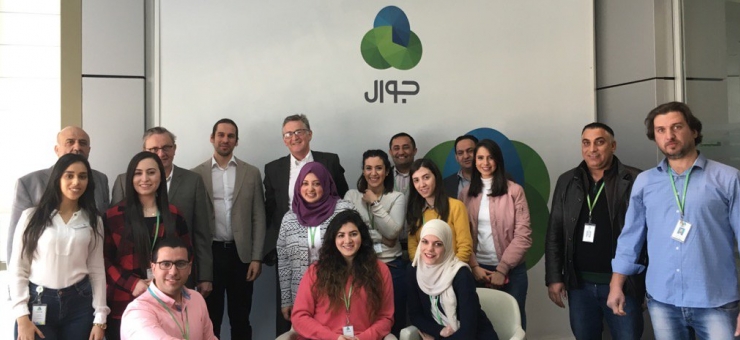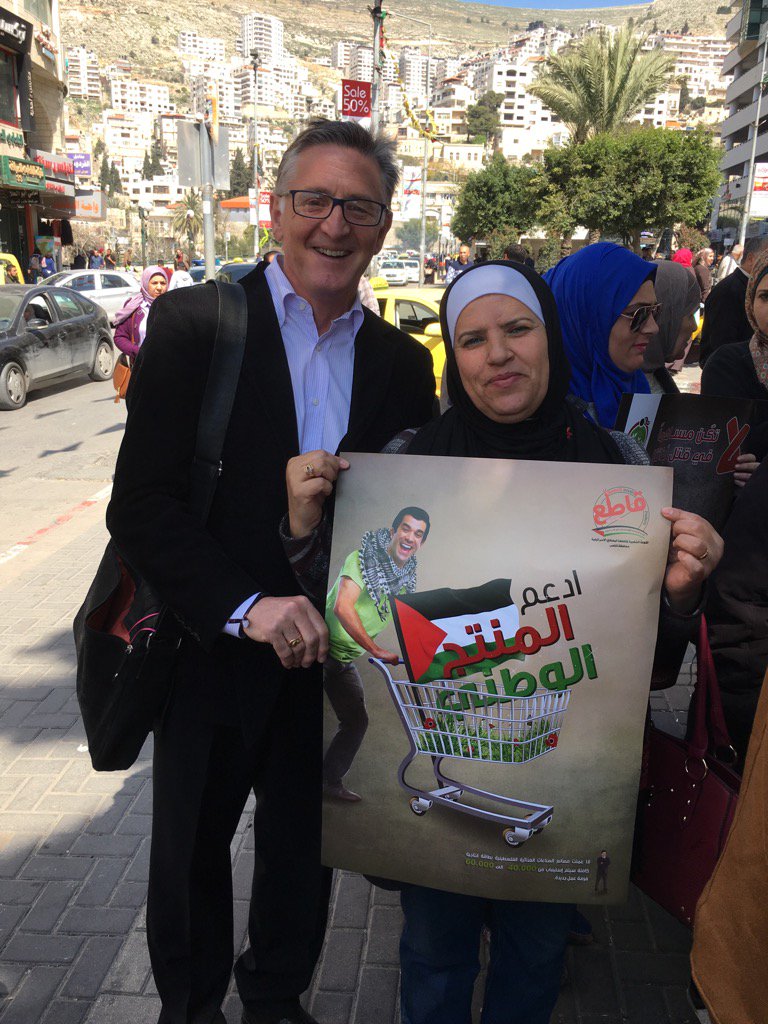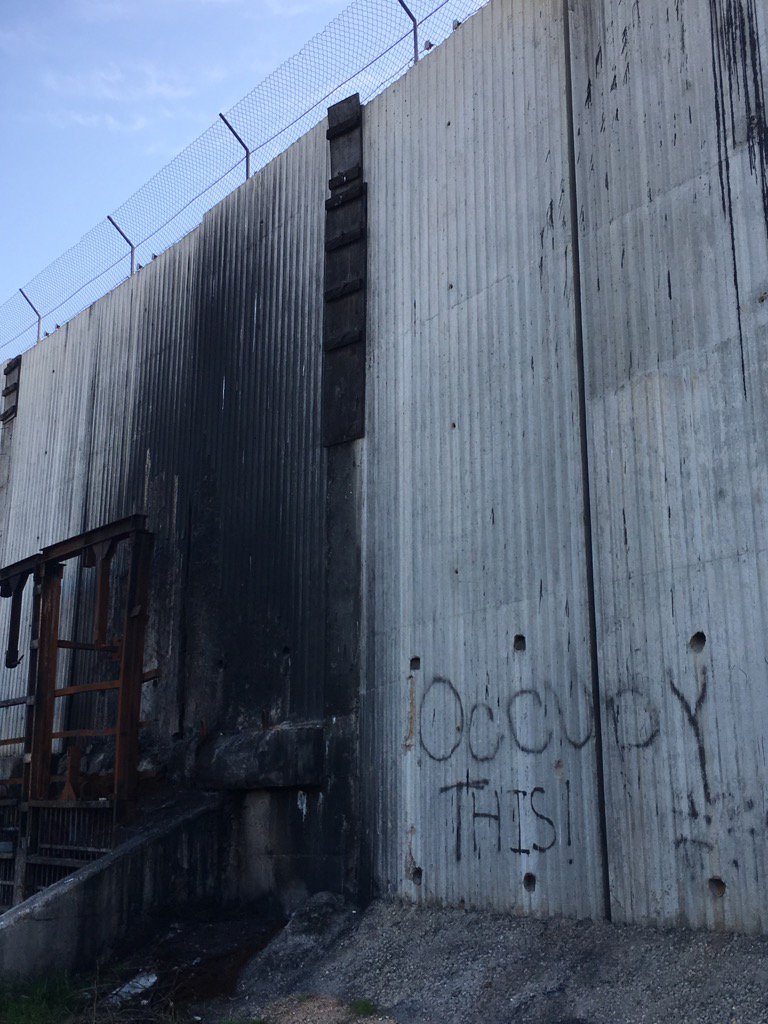News
Visit to Palestine and Israel - Stalled peace process is pushing tensions to breaking point

UNI General Secretary Philip Jennings recently visited Palestine upon the invitation of Shaher Saed, the General Secretary the Palestinian Trade Union Centre. The invitation followed a meeting between Jennings and Shaher during the UGTT Congress in Tunis. A visit to Israel was also included to meet with the affiliates at the Histadrut. The GS was accompanied by Andy Snoddy, Head of UNI SCORE and Alex Högback of ICTS Global Union.
For some time UNI has been hoping to get a “Breaking Through” initiative off the ground in Palestine with our members in the PGFTU in the Finance, ICTS and Graphical sectors – the visit was intended to give this goal momentum. The visit built upon the high-level mission to Palestine and Israel by UNI Global Union in 2014 and our Cape Town Congress resolution. It also gave us the opportunity to get a sense on the ground as to the prospects for peace in this troubled region. There is a sense of frustration at the lack of meaningful peace negotiations and the continuing occupation - exemplified by the recent UN Security Council adopting a tough resolution against further construction of settlements in the occupied territories. The election of Donald Trump as the President of the United States also poses a new threat to stability in the region. His flippant and nonchalant attitude to a complex geopolitical climate serves to undermine the peace process. His statement that he can “live with either a two-state or one state solution, whatever”, combined with the promise to move the US Embassy to Jerusalem has thrown new uncertainty over the commitment to a two-state solution and threatens to exacerbate the prospect for peace.
In Israel, UNI met with Histadrut and the leadership of its four affiliated organisations. Histadrut is growing in membership, has negotiated significant new collective agreements and won a breakthrough legal case to ensure employer’s “neutrality” during organizing campaigns. Histadrut has recorded net membership growth of 150.000 during the last 5 years. Each of our affiliates in ICTS, Finance, Commerce, Care, Post and Logistics and P&M are growing. The IT union, a union startup is growing rapidly and already counts over 17.000 members. Our affiliate UCAPSE now represents 300.000 members and is the largest affiliate of Histadrut. Although unions are thriving, the same cannot be said about the general political environment in the country or the lifeless peace process. The election of Trump has emboldened Prime Minister Netanyahu to build thousands more illegal settlements in the West Bank. The unions expressed concern that a “dead” peace process will mean more anger and violence as the hope for a two-state solution fades. It was observed that the situation is more difficult than a decade ago. The message to the delegation was that both parties must engage in peace negotiations; failure to do so would result in a further escalation in tensions.
In Israel, those pushing for the two-state solution find themselves being drowned out by those in opposition. The decision of the Knesset to bar entry to individuals and organization supporting the Boycott, Divestment and Sanctions (BDS) against the State of Israel will further agitate global opinion and was subject to criticism in the Israeli media. Histadrut and PGFTU cooperate across a range of issues from fees collection to grievance handling for construction workers and our affiliates would like to further develop union to union programmes.
In Palestine, we met with UNI affiliates, representatives of the Palestine Authority, with four CEOs from our sectors and visited a checkpoint where 15.000 Palestinians holding work permits cross each day. We also visited the Balata refugee camp in Nablus, witnessed the separation wall, saw the settlements which are home to 500.000 settlers in the West Bank, met with the FES and the ILO Jerusalem office. Furthermore, we met the leader of the ILO delegation in Palestine, who is currently preparing the report on employment and working conditions in the occupied territories for presentation to the 2017 International Labour Conference. We also met with the independent union of Postal Workers which is a member of the new Communications Union.

UNI attended the PGFTU Congress in 2016 which promised new elections in their member unions. We met with the new leadership in the Finance, ICTS and Graphical sectors. The PGFTU has had a difficult 2016 as there were tensions with the Palestine Authority on several points. Nevertheless, a breakthrough has been achieved with the agreement to create a new social security fund for Palestinian workers. The unions have been included in the governance structure. We see this as yet another component of building a Palestinian State. There are also discussions taking place for a new trade union law with the involvement of the ILO. Philip Jennings also met with the Deputy PM of Palestine Authority and the Deputy Governor of Nablus for a discussion about the peace process. The frustration with the stalled peace process, the occupation and the situation in Gaza was evident.
Signs of the occupation in the West Bank are everywhere to be seen. The stress and strains of the occupation exert a heavy toll on the local population. Youth unemployment is at an unsustainable level of 40%. At Jawal mobile company, we were informed that 30.000 people apply for just a handful of jobs. Of 43.000 graduates coming on to the labour market in Palestine each year, only a fraction find work. The Palestinian economy is flat whilst the Israel economy grows. The frustration and anger at the failure of the peace process is stretching tensions to breaking point. In an exchange with young people at the Balata refugee camp, we asked what gave them grounds for optimism, a participant declared: “We have hope that one day we will be free. This is our land, we will not leave it”.

The West Bank is a scene of daily provocation, overt military action, continued settlement building and significant obstacles to physical movement. An example of the consequences on business was the JAWAL telecoms company that informed us that they are competing with Israeli companies which have 4G capability, whilst their infrastructure is still 2G. An appeal was made to UNI Global Union to help them gain access to the latest technology so that they could compete on even terms.
There are daily issues with water, energy and transport. Even when workers have permits to work in Israel, it takes hours every day to cross the Israeli checkpoints. There is anger at labour brokers in both Israel and Palestine that exploit Palestinian workers.
We did not visit Gaza but intend to prior to the 2018 Liverpool Congress.
We are putting a report together on the mission which will be circulated in due course. The detailed report presented to our Cape Town Congress on Israel and Palestine continues to be an accurate description of the situation in the two countries. Philip Jennings said the world must not accept a “stalled” peace process as a new normal. We must work to get the peace process on the move again. In recent weeks, several trade union delegations had visited Palestine. It is vital that we each use our leverage to ensure that the plight of Palestine people does not fall off the global agenda and the call for the supporters of peace within Israel and Palestine is met with a new peace initiative.
Philip Jennings said the policy adopted in Cape Town at the UNI Global Union World Congress has not lost any of its relevance and continues as our basis for action.
The aim is that a further high level mission to Israel and Palestine will take place prior to the Liverpool Congress.

